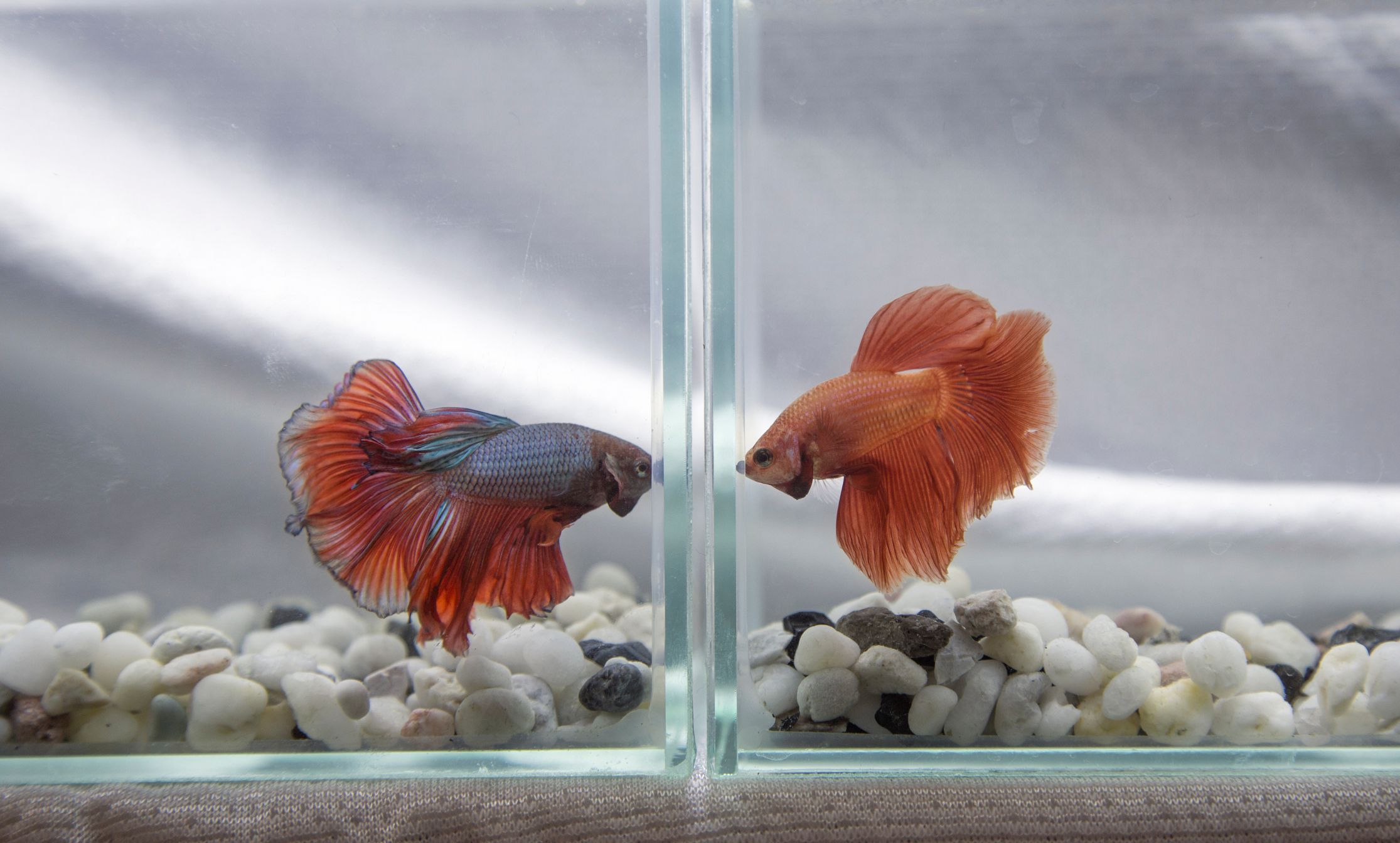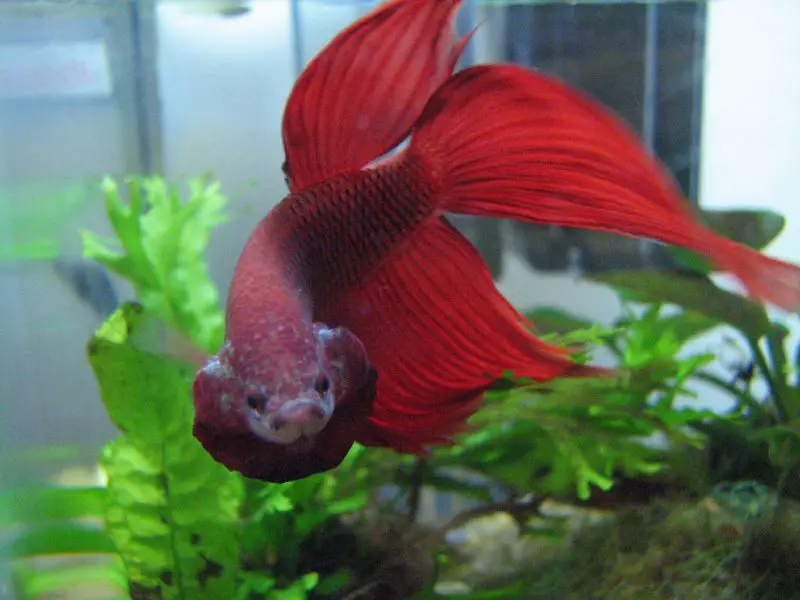Originally posted on May 11, 2023 @ 10:00 am
Last Updated on 7 months by admin
Betta fish, also known as Siamese fighting fish, are popular pets among fish enthusiasts for their vibrant colors and unique personalities. However, they are notorious for their aggressive behavior towards other fish and sometimes even their own kind.
Understanding betta fish aggression is crucial for any pet owner to ensure the health and safety of their fish. In this article, we will explore the reasons behind betta fish aggression and provide tips on how to prevent it, allowing you to enjoy the beauty and company of your betta fish without any worries.

Understanding Betta Fish Aggression and How to Prevent It
Betta fish are known for their vibrant colors and flowing fins, but they are also notorious for their aggressive behavior. It’s not uncommon to see bettas flaring their gills and attacking other fish in the tank. Understanding betta fish aggression is crucial to keeping them happy and healthy. In this article, we’ll explore the causes of betta fish aggression and how to prevent it.
What Causes Betta Fish Aggression?
Betta fish are territorial by nature, and they will defend their space aggressively. They can become aggressive towards other fish, including other bettas, if they feel their territory is being threatened. Betta fish aggression can also be caused by stress, illness, or poor water conditions. It’s important to identify the cause of the aggression before taking any action.
To prevent betta fish aggression, it’s important to provide them with a suitable environment. Betta fish need a tank with plenty of hiding places, such as plants and decorations. They also need a filter to maintain water quality and a heater to keep the water temperature stable. Providing a comfortable environment will reduce stress and prevent aggression.
Signs of Betta Fish Aggression
It’s important to be able to recognize the signs of betta fish aggression so that you can take action before any serious harm is done. The most obvious sign of aggression is flaring of the gills and fins. Betta fish may also chase and nip at other fish in the tank. If you notice any of these signs, it’s important to separate the aggressive fish from the others.
Preventing Betta Fish Aggression
Preventing betta fish aggression requires a few key steps. First, make sure your betta fish has a suitable environment. This means providing hiding places, a filter, and a heater. It’s also important to feed your betta a healthy and varied diet. A well-fed fish is less likely to become aggressive.
Second, avoid overcrowding the tank. Betta fish need their own space, so make sure there is plenty of room for each fish in the tank. Overcrowding can lead to stress and aggression.
Finally, observe your betta fish regularly. If you notice any signs of aggression, take action immediately. This may mean separating the aggressive fish from the others or adjusting the environment to reduce stress.
Betta Fish Aggression Vs. Normal Behavior
It’s important to remember that some level of aggression is normal for betta fish. Flaring of the gills and fins is a natural behavior that can be triggered by other fish or even their own reflection. It’s only when the aggression becomes excessive or harmful that action needs to be taken.
If you’re introducing a new fish to the tank, it’s important to monitor their behavior closely. Some level of aggression is normal during the introduction period, but it should subside within a few days. If the aggression continues, it may be necessary to separate the fish.
Betta Fish Aggression Benefits
While betta fish aggression can be harmful to other fish in the tank, it does have some benefits. Aggression is a natural behavior that helps betta fish defend their territory and find a mate. In the wild, betta fish need to be aggressive to survive.
In captivity, betta fish aggression can be managed through proper care and maintenance of the tank. By providing a suitable environment and monitoring their behavior, you can minimize the negative effects of aggression while still allowing your betta fish to exhibit their natural behavior.
Conclusion
Understanding betta fish aggression is crucial to providing a healthy and happy environment for your fish. By identifying the causes of aggression and taking steps to prevent it, you can ensure that your betta fish thrive in their tank. Remember to observe your fish regularly and take action if you notice any signs of aggression. With proper care and attention, your betta fish can live a long and healthy life.
Frequently Asked Questions
Below are some frequently asked questions about understanding Betta fish aggression and how to prevent it.
What causes Betta fish aggression?
Betta fish are naturally territorial and aggressive towards other fish, especially of the same species or similar appearance. This behavior is a result of their natural survival instincts in the wild, where they must compete for food and mates. In a home aquarium, Betta fish may become aggressive due to a lack of space, inadequate hiding spots, or improper water conditions. Additionally, introducing new fish or rearranging the aquarium can trigger aggressive behavior.
To prevent Betta fish aggression, it is important to provide enough space and hiding spots for each fish in the aquarium. Maintaining clean water and avoiding overcrowding can also help to reduce stress and aggression. Introducing new fish slowly and in small numbers can also reduce the risk of aggression.
How do I know if my Betta fish is aggressive?
Signs of Betta fish aggression include flaring of fins, chasing other fish, and nipping or biting. If you notice any of these behaviors, it is important to monitor your Betta fish closely and take steps to prevent further aggression. You may also notice physical injuries or damage to the fins of other fish in the aquarium.
If you notice aggressive behavior in your Betta fish, it is important to provide enough space and hiding spots, as well as maintaining proper water conditions. You may also consider separating the aggressive fish from others in the aquarium.
Can Betta fish live with other fish?
Betta fish can live with other fish, but it is important to choose compatible species and provide enough space and hiding spots for each fish. Some suitable tank mates for Betta fish include peaceful and non-aggressive species such as tetras, guppies, and cory catfish. It is important to avoid keeping Betta fish with other fish that are similar in appearance or behavior, as this can trigger aggression.
Introducing new fish slowly and in small numbers can also help to reduce the risk of aggression and allow the Betta fish to adjust to their new tank mates. It is important to monitor the fish closely and be prepared to separate any aggressive fish if necessary.
What should I do if my Betta fish is injured due to aggression?
If your Betta fish is injured due to aggression, it is important to remove the injured fish from the aquarium and place it in a separate tank or container with clean, warm water. You may also need to treat the fish with medications or aquarium salt to prevent infection and promote healing.
To prevent further aggression, it is important to review the aquarium setup and water conditions, and make any necessary changes to reduce stress and aggression. You may also need to separate the aggressive fish from others in the aquarium to prevent further injuries.
How can I prevent Betta fish aggression?
To prevent Betta fish aggression, it is important to provide enough space and hiding spots for each fish in the aquarium. Maintaining clean water and avoiding overcrowding can also help to reduce stress and aggression. Introducing new fish slowly and in small numbers can also reduce the risk of aggression.
It is also important to choose compatible tank mates for Betta fish and avoid keeping fish that are similar in appearance or behavior. If you notice aggressive behavior in your Betta fish, it is important to monitor the fish closely and be prepared to separate any aggressive fish if necessary.

BETTA FISH AGGRESSIVE BEHAVIOR!!!
In conclusion, understanding betta fish aggression is crucial for any owner as it can lead to serious injuries or even death of the fish. By recognizing the signs of aggression and implementing preventative measures, such as providing ample space and hiding places, owners can ensure a safe and peaceful environment for their bettas. It is also important to note that aggression can be influenced by external factors such as water quality and tank mates, so regular maintenance and careful selection of tank mates can go a long way in preventing aggression. With proper care and attention, bettas can thrive in a peaceful and happy environment.
